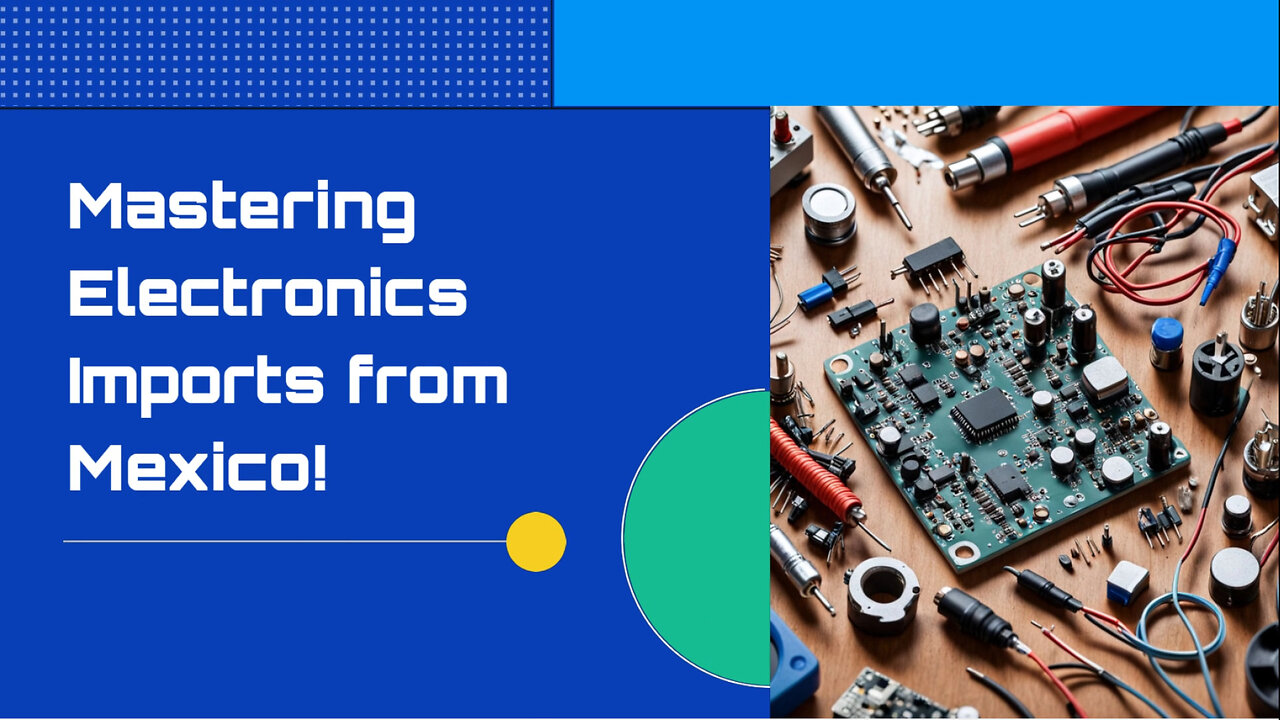Premium Only Content

Mastering Customs Regulations: Your Guide to Importing Electronics from Mexico
ISF Entry | Phone: 800-215-1849 | Email: [email protected] | https://isfentry.com/
Welcome to our channel! Today, we will be discussing the customs regulations for importing electronics from Mexico. In international trade, customs brokerage plays a crucial role in ensuring compliance with customs regulations. Customs brokers are hired by businesses to handle the complex procedures involved in importing goods, and their expertise in customs laws can help streamline the import process.
When importing goods into the United States, a key requirement is a customs bond. This bond acts as a guarantee that all customs duties, taxes, and fees will be paid by the importer, providing financial protection to the government in case of non-compliance.
Another important aspect to consider when importing goods is the Importer Security Filing (ISF), also known as the 10+2 rule. This rule mandates that importers submit specific information about their shipments to US Customs and Border Protection (CBP) at least 24 hours before the cargo is loaded onto the vessel. The purpose of the ISF is to enhance cargo security and enable CBP to assess and mitigate potential risks associated with the importation of goods.
Mexico is a major exporter of electronic goods to the United States, and understanding customs regulations is vital when importing electronics from Mexico. Here are some key customs regulations to be aware of:
1. Tariffs and Duties: Electronics may be subject to import duties, which vary depending on the specific product. Understanding the tariff classifications and rates is essential for accurate assessment and payment of duties.
2. Product Certifications: Certain electronic products require specific certifications to ensure compliance with safety and quality standards. Obtaining these certifications before importing the goods is crucial.
3. Intellectual Property Rights (IPR): Protecting intellectual property is important in the electronics industry. It is essential to ensure that the imported goods comply with IPR laws, such as trademarks, copyrights, and patents.
4. Regulatory Restrictions: Some electronics may be subject to regulatory restrictions due to national security concerns or environmental regulations. Familiarizing yourself with these restrictions will help ensure compliance.
To navigate these regulations smoothly, it is highly recommended to work with an experienced customs broker. They can assist with customs documentation, tariff classification, compliance, and other customs-related matters, ensuring a hassle-free importation process.
In conclusion, importing electronics from Mexico can be a lucrative business opportunity, but it is crucial to understand and comply with customs regulations. By partnering with a customs broker, obtaining a customs bond, and submitting an accurate ISF, importers can ensure a smooth and efficient import process. Thank you for watching! Be sure to subscribe to our channel for more videos on international trade and customs-related topics.
#usimportbond #isfcustomsbroker #uscustomsclearing #isfentry
Video Disclaimer Here: This educational content is unassociated with US governmental bodies.
1:22 - Importer Security Filing (ISF) or 10+2 rule requires importers to submit shipment information to US Customs and Border Protection 24 hours before loading onto vessel for enhanced cargo security.
2:02 - Electronics, like all imported goods, are subject to customs regulations when importing from Mexico.
2:37 - Obtain certifications before importing goods, such as Intellectual Property Rights (IPR) to protect intellectual property in the electronics industry.
3:06 - Familiarize yourself with restrictions to avoid non-compliance and work with experienced customs broker for smooth navigation of regulations.
3:47 - Partnering with customs broker, obtaining customs bond, and submitting accurate ISF ensures smooth and efficient import process in international trade. Subscribe for more videos on customs-related topics.
-
 LIVE
LIVE
Badlands Media
11 hours agoDEFCON ZERQ EP017
18,850 watching -
 3:11:56
3:11:56
TimcastIRL
4 hours agoDOJ Launches FULL INVESTIGATION Into TPUSA Antifa RIOT, Media Says Mostly Peaceful | Timcast IRL
226K60 -
 3:16:27
3:16:27
Barry Cunningham
8 hours agoBREAKING NEWS: SOLVING THE HOUSING CRISIS BY UNDERSTANDING VETERANS DAY! AND IT'S MOVIE NIGHT!
52.5K21 -
 LIVE
LIVE
SpartakusLIVE
6 hours agoWZ Solos to Start || NEW Battlefield 6 - REDSEC Update Later
289 watching -
 1:01:56
1:01:56
ThisIsDeLaCruz
14 hours ago $1.50 earnedInside Kenny Chesney’s Sphere Part 1: Exclusive Backstage Pass
10.3K -
 LIVE
LIVE
DLDAfterDark
3 hours ago $0.41 earnedA Complete Look Into The Glock "V Series"! Pistol In Hand! VERY GAY!!
130 watching -
 7:42
7:42
China Uncensored
10 hours agoIndia Has Surpassed China
11.9K10 -
 8:47
8:47
Hollywood Exposed
8 hours agoJoe Rogan and Zachary Levi DESTROY Gavin Newsom’s Lies About California
6.32K3 -
 LIVE
LIVE
BlackDiamondGunsandGear
2 hours agoInside NEW Glock V Models / Whats Next? / You giving up Glock?
200 watching -
 2:05:31
2:05:31
Glenn Greenwald
7 hours ago"Former" Al-Qaeda Leader Welcomed to the White House; The "New TikTok" Clamps Down on Israel Critics: With Influencer Guy Christensen; Dave Portnoy Decries Cancel Culture, Unless His Group is Under Attack | SYSTEM UPDATE #545
123K56